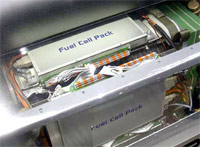Nisshinbo Industries Inc. has worked with the Tokyo Institute of Technology to develop the technology to use carbon instead of expensive platinum as the electrode catalyst for fuel cells.
The company hopes to have a practical version of the new catalyst ready in fiscal 2009, and will start by commercializing a product for the electrodes of residential fuel cells. Later, it will develop and commercialize a version for automotive fuel cells.
In a fuel cell, the catalyst promotes the oxidation-reducing reactions at the electrodes that lead to the generation of electricity from the hydrogen fuel and oxygen in the air. Platinum is now used as the catalyst, but high demand and unstable supplies from main producer South Africa have driven prices sky-high. A 1kw-class residential fuel cell uses several grams of platinum and a 150kw-class automotive fuel cell uses around 60 grams, which at current prices adds 400,000 yen (US$3,762) to the cost of a car.
The carbon catalyst promises to remove this cost barrier, which along with the needed infrastructure for hydrogen filling stations is a major roadblock to the adoption of fuel cells for homes and cars.
The new catalyst is made from nanospheres of carbon. For practical purposes as a fuel cell catalyst, 10 times more carbon is required than platinum; but even in this larger volume, the cost is just a 10th that of using platinum.

